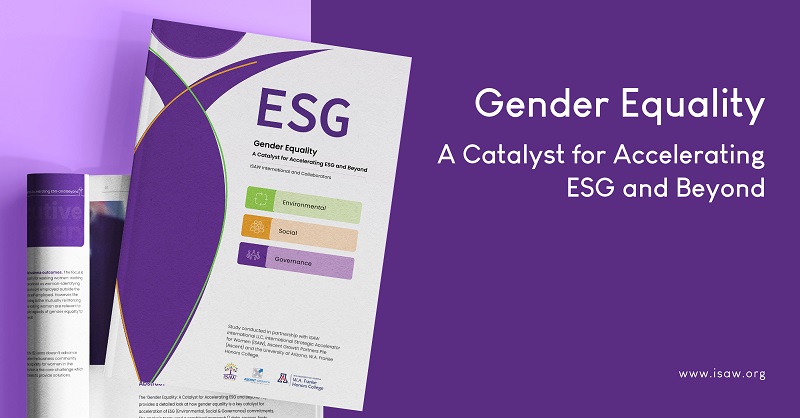“Gender Equality: A Catalyst for Accelerating ESG and Beyond,” a new report from the international strategic accelerator for women iSAW, examines in detail the key catalysts for accelerating ESG (Environmental, Social and Governance) commitments.
Here is a guide to help companies boost their gender equality for women to create a collective global impact and have a ripple effect to accelerate all aspects of ESG and broader aspects of business performance.
The aim is to create visionary innovations and mindsets to be used as a catalyst to educate, uplift and empower women at all levels within their organisations and, more broadly, within their communities and society.
Who should care and why?
This report aims to raise awareness, offer insight and provide a clear call to action for this change in mindset and behaviour. It will enable:
- Boards of Directors – to give greater confidence to shareholders about their commitment to ESG and the sustainable performance of their organisation and to meet regulatory requirements.
- CEOs and CFOs – to inform capital allocation decisions in their organisations and ensure the most productive use of resources, achieving better business outcomes.
- ESG managers – to accelerate the achievement of various Sustainable Development Goals (SDG) commitments.
- HR and DE&I managers – who want to integrate the achievement of better gender equality and broader diversity and inclusion activities into strategic business objectives.
- Funders, financial services, executives and investors – to be empowered in sectors where ESG plays a key role.
- Public sector leaders and decision-makers – to create a legislative environment in which gender equality and ESG can flourish.
- Women and their allies – be part of a community that learns, leads and influences the change needed to level the playing field for women in the workplace.
Three ways individuals and companies can drive change
Mindset change:
- To tackle ESG on a large scale and at a sustained pace, business leaders need to adopt a forward-looking mindset motivated by long-term goals.
- Business leaders need a ‘mindset shift’ based on gender equality data that demonstrates that gender equality positively impacts key indicators. This includes, but is not limited to the ESG.
Institutionalise gender equality:
- Gender equality must be integrated into the company’s culture and objectives as a strategic lever to address current and future business challenges. Gender equality must move from being a DE&I initiative to a business performance imperative.
- Companies must maintain work environments that are conducive to the development of women at all levels. This requires interventions in human processes (recruitment, promotions, compensation, benefits, etc.) that interrupt bias and regular reporting on progress towards goals.
- Companies need to work with their communities to implement processes that attract women into the workforce, encourage them to grow within their ranks and achieve their full potential. This will include taking a holistic approach to secure their future skills.
Collective impact:
- Share your stories and examples of where you have seen increased attention to gender equality lead to better business outcomes, including meeting ESG commitments.
- Be part of a community of change agents who can learn from each other.










